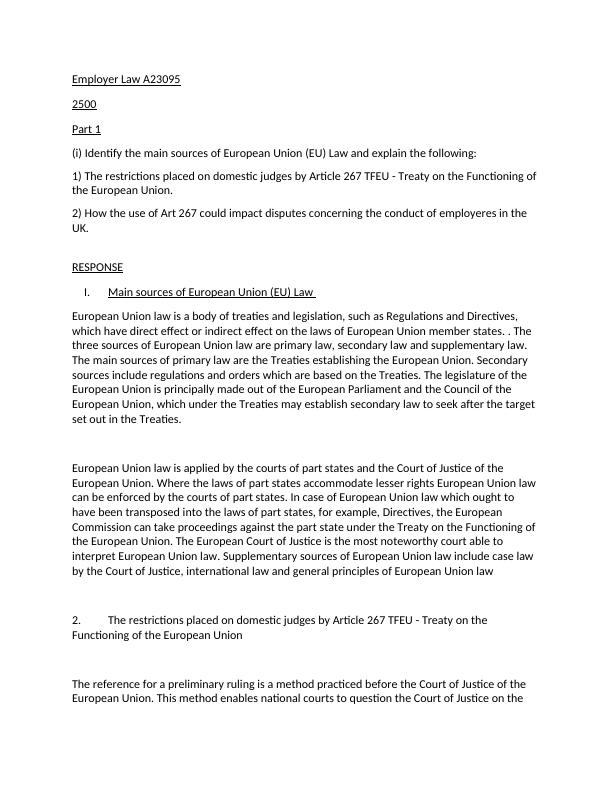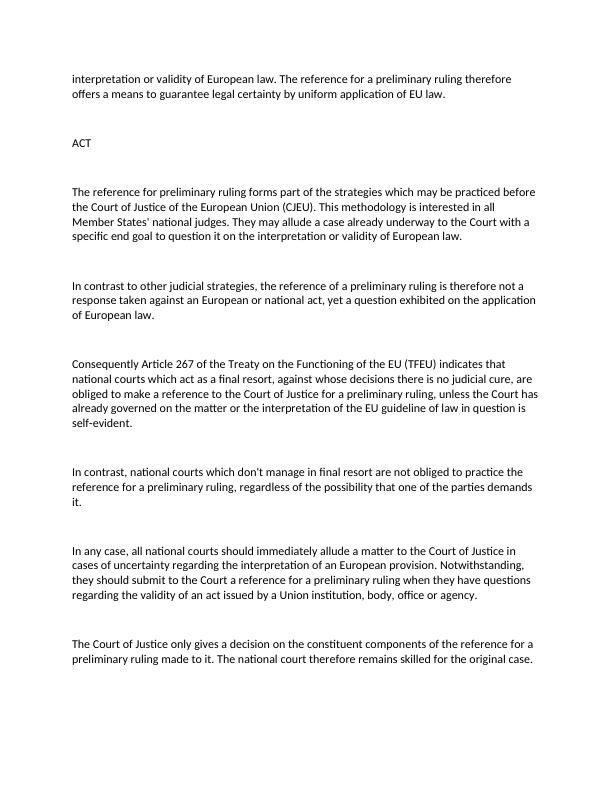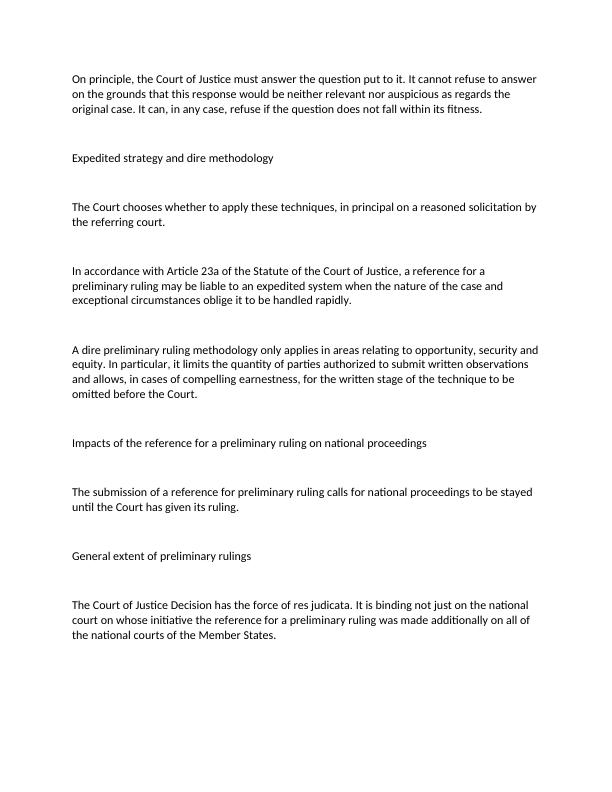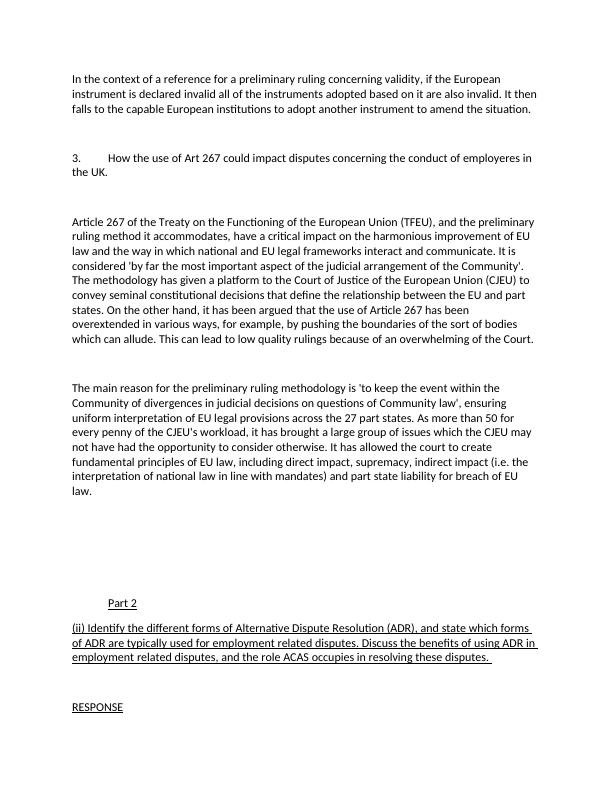Article 267 TFEU - Treaty On The Functioning Of The European Union
16 Pages3653 Words690 Views
Added on 2020-02-05
Article 267 TFEU - Treaty On The Functioning Of The European Union
Added on 2020-02-05
ShareRelated Documents
Employer Law A230952500Part 1(i) Identify the main sources of European Union (EU) Law and explain the following: 1) The restrictions placed on domestic judges by Article 267 TFEU - Treaty on the Functioning of the European Union. 2) How the use of Art 267 could impact disputes concerning the conduct of employeres in the UK. RESPONSEI.Main sources of European Union (EU) Law European Union law is a body of treaties and legislation, such as Regulations and Directives, which have direct effect or indirect effect on the laws of European Union member states. . The three sources of European Union law are primary law, secondary law and supplementary law. The main sources of primary law are the Treaties establishing the European Union. Secondary sources include regulations and orders which are based on the Treaties. The legislature of the European Union is principally made out of the European Parliament and the Council of the European Union, which under the Treaties may establish secondary law to seek after the target set out in the Treaties. European Union law is applied by the courts of part states and the Court of Justice of the European Union. Where the laws of part states accommodate lesser rights European Union law can be enforced by the courts of part states. In case of European Union law which ought to have been transposed into the laws of part states, for example, Directives, the European Commission can take proceedings against the part state under the Treaty on the Functioning of the European Union. The European Court of Justice is the most noteworthy court able to interpret European Union law. Supplementary sources of European Union law include case law by the Court of Justice, international law and general principles of European Union law 2.The restrictions placed on domestic judges by Article 267 TFEU - Treaty on the Functioning of the European Union The reference for a preliminary ruling is a method practiced before the Court of Justice of the European Union. This method enables national courts to question the Court of Justice on the

interpretation or validity of European law. The reference for a preliminary ruling therefore offers a means to guarantee legal certainty by uniform application of EU law. ACT The reference for preliminary ruling forms part of the strategies which may be practiced before the Court of Justice of the European Union (CJEU). This methodology is interested in all Member States' national judges. They may allude a case already underway to the Court with a specific end goal to question it on the interpretation or validity of European law. In contrast to other judicial strategies, the reference of a preliminary ruling is therefore not a response taken against an European or national act, yet a question exhibited on the application of European law. Consequently Article 267 of the Treaty on the Functioning of the EU (TFEU) indicates that national courts which act as a final resort, against whose decisions there is no judicial cure, are obliged to make a reference to the Court of Justice for a preliminary ruling, unless the Court hasalready governed on the matter or the interpretation of the EU guideline of law in question is self-evident. In contrast, national courts which don't manage in final resort are not obliged to practice the reference for a preliminary ruling, regardless of the possibility that one of the parties demands it. In any case, all national courts should immediately allude a matter to the Court of Justice in cases of uncertainty regarding the interpretation of an European provision. Notwithstanding, they should submit to the Court a reference for a preliminary ruling when they have questions regarding the validity of an act issued by a Union institution, body, office or agency. The Court of Justice only gives a decision on the constituent components of the reference for a preliminary ruling made to it. The national court therefore remains skilled for the original case.

On principle, the Court of Justice must answer the question put to it. It cannot refuse to answer on the grounds that this response would be neither relevant nor auspicious as regards the original case. It can, in any case, refuse if the question does not fall within its fitness. Expedited strategy and dire methodology The Court chooses whether to apply these techniques, in principal on a reasoned solicitation by the referring court. In accordance with Article 23a of the Statute of the Court of Justice, a reference for a preliminary ruling may be liable to an expedited system when the nature of the case and exceptional circumstances oblige it to be handled rapidly. A dire preliminary ruling methodology only applies in areas relating to opportunity, security andequity. In particular, it limits the quantity of parties authorized to submit written observations and allows, in cases of compelling earnestness, for the written stage of the technique to be omitted before the Court. Impacts of the reference for a preliminary ruling on national proceedings The submission of a reference for preliminary ruling calls for national proceedings to be stayed until the Court has given its ruling. General extent of preliminary rulings The Court of Justice Decision has the force of res judicata. It is binding not just on the national court on whose initiative the reference for a preliminary ruling was made additionally on all of the national courts of the Member States.

In the context of a reference for a preliminary ruling concerning validity, if the European instrument is declared invalid all of the instruments adopted based on it are also invalid. It then falls to the capable European institutions to adopt another instrument to amend the situation. 3.How the use of Art 267 could impact disputes concerning the conduct of employeres in the UK. Article 267 of the Treaty on the Functioning of the European Union (TFEU), and the preliminary ruling method it accommodates, have a critical impact on the harmonious improvement of EU law and the way in which national and EU legal frameworks interact and communicate. It is considered 'by far the most important aspect of the judicial arrangement of the Community'. The methodology has given a platform to the Court of Justice of the European Union (CJEU) to convey seminal constitutional decisions that define the relationship between the EU and part states. On the other hand, it has been argued that the use of Article 267 has been overextended in various ways, for example, by pushing the boundaries of the sort of bodies which can allude. This can lead to low quality rulings because of an overwhelming of the Court. The main reason for the preliminary ruling methodology is 'to keep the event within the Community of divergences in judicial decisions on questions of Community law', ensuring uniform interpretation of EU legal provisions across the 27 part states. As more than 50 for every penny of the CJEU's workload, it has brought a large group of issues which the CJEU may not have had the opportunity to consider otherwise. It has allowed the court to create fundamental principles of EU law, including direct impact, supremacy, indirect impact (i.e. the interpretation of national law in line with mandates) and part state liability for breach of EU law.Part 2(ii) Identify the different forms of Alternative Dispute Resolution (ADR), and state which forms of ADR are typically used for employment related disputes. Discuss the benefits of using ADR in employment related disputes, and the role ACAS occupies in resolving these disputes. RESPONSE

End of preview
Want to access all the pages? Upload your documents or become a member.
Related Documents
Sources of European Union Law and Restrictionslg...
|11
|3847
|50
European Union (EU) law : Assignmentlg...
|13
|3332
|34
Main sources of European Union (EU) Lawlg...
|11
|2432
|500
Main Sources of European Union (EU) Law - Reportlg...
|8
|2586
|73
Understanding Article 267 TFEU in European Union Lawlg...
|7
|1604
|96
Supremacy and Direct Effects Contributions to the Achievement of CJEUlg...
|9
|2285
|245
